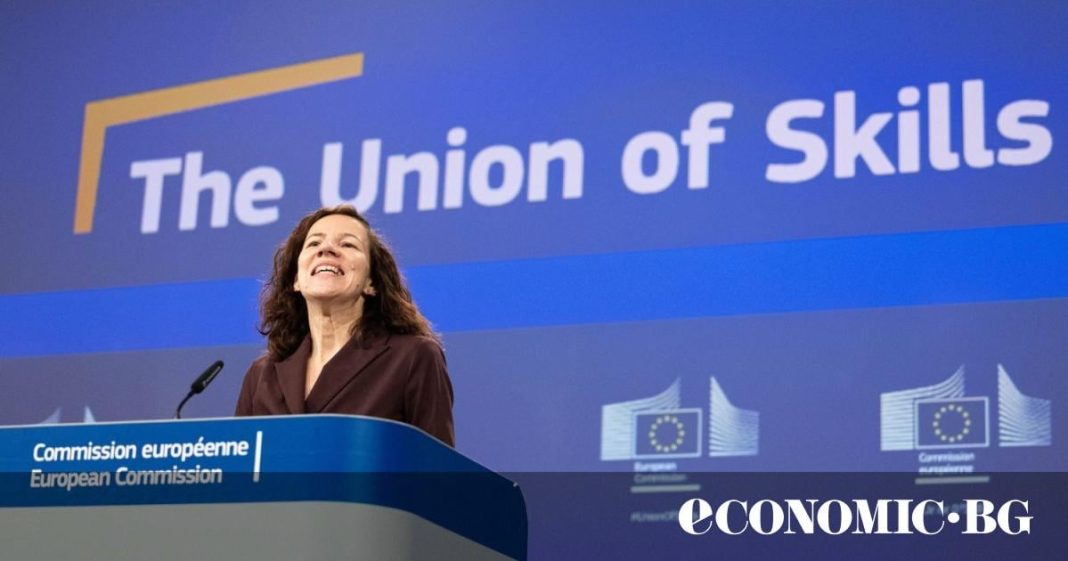Today marks the official launch of the Union of Skills, a transformative initiative spearheaded by Roxana Minzatu, the European Commission’s Vice-President for Social Rights and Skills. Presenting the pioneering initiative with a speech at the European Employment and Social Rights Forum 2025 in Brussels, she dubbed it a „live product“ still under development. With an approach built on four key pillars, this ambitious strategy seeks to create a more agile and responsive skills ecosystem across Europe. Here they are in more detail.
Tackling Skills Deficiencies in Education
The first pillar focuses on decreasing deficits in basic mathematics, science, and digital literacy. Currently, one in three teenagers fails in mathematics, which significantly hinders their readiness for future jobs and services. The Union of Skills, positioned as a medium- and long-term effort, will involve collaboration with educational providers across member states.
Minzatu highlighted two significant measures within this pillar: the expansion of the basic skills package from four to five subjects. This will now include citizenship education, which fosters things like media literacy and societal engagement. In addition, there will be targeted support for schools facing systemic underperformance.
Upskilling and Reskilling to Face Industry Disruptions
The second pillar addresses the need for continuous learning to respond to disruptive changes in various industries. It also responds to the need to keep the workers currently making the European workforce productive. Minzatu emphasized the importance of shifting mindsets around upskilling, likening it to an annual health check-up—essential for maintaining job relevance. This initiative includes the piloting of a Workers’ Skills Guarantee in 2026, aimed at retaining employees by ensuring their knowledge is adapted to industry changes, such as those seen in the automotive sector.
Enhancing Internal Mobility of Skills
One of the boldest components of the Union of Skills is its third pillar. This one is about ensuring the automatic recognition of skills across EU member states. The portability of skills is a crucial aspect of making the job market more accessible and efficient, benefiting both employers and job seekers.
As part of this effort, Minzatu announced work on developing a European Degree, for example in fields such as engineering, to standardize qualifications across borders and facilitate smoother transitions for professionals within the EU.
Legal Migration and Talent Attraction
The fourth pillar extends beyond the EU, focusing on attracting skilled job seekers and students from outside the region. Recognizing the value of diversity in the workforce, the initiative also aims to support underrepresented communities, including women and Roma populations.
Minzatu outlined key programs under this pillar, such as:
- A visa program designed to simplify the process for skilled workers to relocate to Europe.
- A scholarship initiative aimed at making European academia more attractive to international researchers.
- Enhanced support for integrating foreign workers into European societies in a way that meets both social and economic needs.
A Unified Approach to Skills Development
Roxana Minzatu acknowledged the fragmented nature of the current skills landscape in Europe and emphasized the need for a more structured and agile system. The initiative will foster collaboration between governments, companies, trade unions, and universities to create impactful policies.
A cornerstone of this strategy is the proposed European Skills Intelligence Observatory, a data-driven initiative aimed at forecasting skill shortages and anticipating future labor market demands. Additionally, the Union of Skills incorporates a strong gender dimension, particularly in STEM fields, with a goal of bringing 1 million female students into STEM programs by 2030.
Bringing the Union of Skills to Life
At its core, the Union of Skills is about real individuals whose careers and futures depend on the effectiveness of these policies.
The Union of Skills is about living people in flesh and blood. It is up to the member states and stakeholders to make this proposal a reality,” emphasized Minzatu.
To ensure the initiative gains traction, she plans to visit every EU member state this year, engaging directly with local stakeholders and promoting the benefits of the Union of Skills.
Източник: Economic.bg


